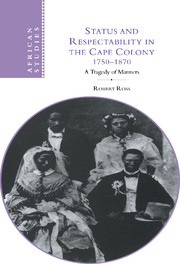Book contents
7 - Acceptance and rejection
Published online by Cambridge University Press: 07 July 2009
Summary
The celebration and disappointments of emancipation
On 1 December 1834, large numbers of men, women, boys and girls who until that day had been slaves ‘promenaded the streets’ of Cape Town, ‘many of them attended by a band of amateur musicians’. They had paraded before, to celebrate the New Year, a day on which they had been ‘permitted to enjoy the day with their own friends; on which occasion they dress in all their best clothes’, and perhaps followed bands round the streets. On this day, though, matters were different – joyous, not drunken, but tinged with sadness for those who had not lived to see their freedom, and whose tears, at least according to later tradition, caused it to rain, unseasonably, on Emancipation Day.
Some decades later, J. G. Steytler recalled the parades as follows:
I saw a number of processions of Coloured people with two or three sympathisers at their head, parading Cape Town, singing a Dutch song, in which every verse ended ‘Victoria! Victoria! Daar waar de Engelschen vlag’ [There the English flag is flying]. My mother asked a Coloured girl to go on an errand for her, she said ‘No, I won't, we are free today!’
In its details, this cannot be a fully accurate account. Queen Victoria was not on the throne in 1834, and even if Steytler was actually describing the ending of Apprenticeship, four years later, the Queen had not yet acquired the mythic status she would later have.
- Type
- Chapter
- Information
- Status and Respectability in the Cape Colony, 1750–1870A Tragedy of Manners, pp. 146 - 172Publisher: Cambridge University PressPrint publication year: 1999

